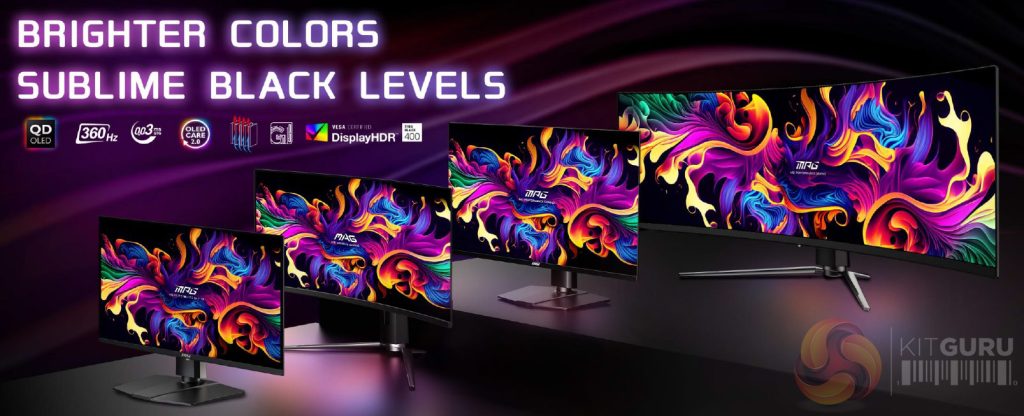According to the monitor team at MSI, the company’s decision to move its high-end screens across to quantum dot OLED technology, will give them the ‘purest black and most vibrant colours possible’. Promising refresh rates up to 360Hz, grey-to-grey cycles as low as 0.03ms and VESA Certified DisplayHDR – on a range that goes up to 49” wide – you have to wonder about the likely retail price points for that kind of visual tech. These screens will be given a full public outing for the first time at CES in Las Vegas when it opens Tuesday Morning, but KitGuru got early access to the screens and technical details back in December at MSI HQ in Taiwan.
We were told that as well as the best image quality ever seen on an MSI monitor, they have completely overhauled their approach to longevity on these new OLED screens, with a number of software features designed to extend the life of your new QD OLED – while a number of other tweaks can improve your in-game experience.
At the top end of the range, the initial models will include:-
MPG 491CQP QD
This the largest screen at 49”, providing 5,120×1,440 resolution, 0.03 GTG and a 144Hz refresh rate – aimed at serious content creators or those who need a lot of data on the screen at once from multiple sources. We're expecting this to launch at €1,699 in Europe – UK pricing on all of these will follow soon
MPG 321URX / 271QRX
Staying with the ‘P’ performance series, these screens offer the 240/360Hz refresh rates that will most appeal to competitive gamers. Expect it to land around €1,399
MAG 231CQP
The ‘A’ indicates a more affordable solution, although this UWQHD (3,440×1,440) product will refresh at 175Hz with a 0.03 GTG
As we all know, QD OLED technology can run hot, so these panels use a combination of graphene film on the back – to help even out hot spots – alongside custom heatsinks that mean the products can run fanless.
When in use, the MSI OLED Care 2.0 software will look for logos that remain stationary on the screen and it will automatically reduce brightness in that area. Similarly, when you have something like a taskbar in Windows or a ‘controls/info’ area in a game, those areas will be detected and slightly dimmed. This tech also kicks in when ‘boundaries’ are detected between two bright areas – for example two objects sitting side by side (ground/sky) or on top of each other (stationary building against bright sky).
Alongside the graphene/heatsink hardware and OLED Care 2.0 software, the final part of MSI’s new approach to OLED, is to offer a nice buzzword of a feature with ‘A.I. Vision’ to enhance your in-game experience. In this instance, the monitor and its control software will be working in the background to pull out extra detail in dark areas, alongside checking/adjusting colour saturation and brightness in games.
Like other gaming monitors, MSI's OLED displays do offer an on-screen crosshair. However, MSI has taken things a step further by allowing the crosshair to change colour to stand out better against targets in the background, and a new ‘Optix Scope' can auto-zoom on targets – we'll have to see how that one plays out as it could be considered a cheat in online shooters.
MSI is expecting its software to improve over time, so it will allow firmware updates via USB.
Physically, these panels have an anti-reflection coating that should help you distinguish between bright lights in-game and household light sources behind you when you play.
All of the new screens have a VESA Certified ClearMR (CMR) rating from 8,000 (49” model) up to 13,000 (27” and 32” models) – indicating that images on your display should remain crisp, even when in motion. The CMR score is calculated based on the ratio of clear to blurry pixels on the screen at any one time.
Another VESA-certification is on the new MSI screen’s ability to display black. All panels suffer some kind of light-leak and it’s the product design team’s job to minimise that effect. Unlike conventional LCD displays, QD-OLED can achieve pixel-dimming level control and give you pure black scenes without any backlight bleeding that is common with LCD monitors.
All of MSI’s QD-OLED screens aim to deliver extremely high contrast – hence the certified VESA DisplayHDR True Black 400 logo on the box.
If the display tech integrated into these new screens is appealing, but your bank balance is unlikely to share your desire to spend over £1,500 on a new monito – then you’re in luck. MSI has also launched the MAG 274 and MSG 323 UPF versions. These have a much easier to achieve 1ms GTG response and refresh at 160/140Hz respectively with DisplayHDR 600. Pricing on these and the other models will firm up for the UK channel in the coming days.
As you would expect, G-Sync and FreeSync are supported and MSI has done its best to make the size of the desk stand as shallow as possible – to make it easier for you to position your keyboard/mouse etc. There are also integrated USB charging ports that generally deliver around 65w for your devices – alongside Tolt/Height/Swivel/Pivot adjustments. Finally, MSI is sensitive to the fact that these screens are not cheap and (if their performance claims hold true) that these will be the nicest screens you have ever owned – which is why they have worked to make sure they are KVM compatible, which means they can easily be switched between your main PC, your laptop and your gaming console(s).
You can expect to see these products in retail stores further into Q1.
KitGuru Says: We'll be at CES next week so expect plenty more coverage straight from the show floor in the days ahead.
 KitGuru KitGuru.net – Tech News | Hardware News | Hardware Reviews | IOS | Mobile | Gaming | Graphics Cards
KitGuru KitGuru.net – Tech News | Hardware News | Hardware Reviews | IOS | Mobile | Gaming | Graphics Cards





